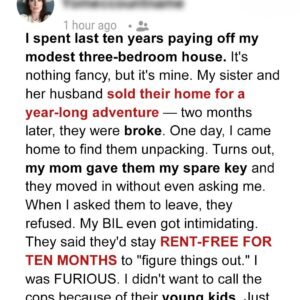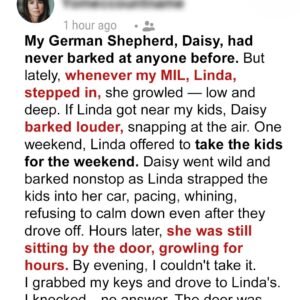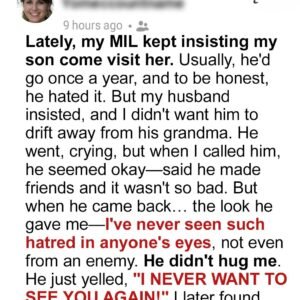My son came home with tears in his eyes and a weight in his chest no seven-year-old should ever carry. He mumbled something about a class potluck and how everyone had been asked to bring their mom’s special dish — everyone except him.
“Because I’m the poor kid,” he whispered.
My heart cracked. I could barely speak. But one thing was clear — I would not let my child carry shame for something that wasn’t his fault.
That night, I stayed up making my grandmother’s apple-caramel pie. The kind we used to bake together when times were tight and love was stretched across every crust edge and cinnamon swirl. It wasn’t just a dessert. It was a message.
The next day, pie in hand, I marched into the school. My intention? To confront the teacher for making my son feel excluded.
But her expression stopped me cold. Genuine confusion crossed her face as she said, “I never told anyone not to bring food. I even sent a note home saying kids who couldn’t bring anything were still welcome.”
She pulled out a copy of the note. I recognized it — crumpled and buried at the bottom of Callen’s backpack.
My confusion shifted to concern. “Then… who told him he couldn’t participate?”
The teacher’s voice dropped. “That might be a bigger issue.”
And that’s when I learned the truth.
It wasn’t the school. It wasn’t a misunderstanding. It was another student — Alden Farrow. A child from a wealthy family who decided to tell my son that “poor kids don’t bring food” because it would “embarrass the class.”
The pie nearly slipped from my hands.
I grew up with not much more than hand-me-downs and school lunches that invited more stares than smiles. But hearing my own child was now enduring that same coldness? It set something inside me alight.
“What happens now?” I asked.
The teacher hesitated. “Alden will deny it. And his parents… they’re big donors. But I’m not ignoring it. I’ll speak to the principal.”
Then she looked at the pie in my hands.
“You came all this way. Would you like to stay for the potluck?”
I looked down at it — golden crust, warm filling, still smelling like cinnamon and resolve.
“I would,” I said.
The cafeteria buzzed with chatter and clinking forks. Tables were lined with casseroles, slow cookers, trays of sweets. I spotted Callen near the back, shrinking into his hoodie, trying to disappear.
I walked straight to him and placed the pie on the dessert table.
“Hey,” I said, softly. “I brought something. Want to help me serve it?”
His eyes widened. “You really did?”
“I told you I would. And by the way, it wasn’t your teacher who said those things.”
His expression fell.
“It was Alden, wasn’t it?”
A slow nod.
“He said I’d bring store-brand trash,” Callen murmured. “That people would get sick.”
I knelt beside him and said, “People like that think money makes them better. But kindness — that’s real wealth. And we don’t back down. We show up.”
Callen straightened his shoulders. “Can I serve the first slice?”
“You better.”
And so we did.
Soon, kids were coming back for seconds. Someone asked who made the pie.
“Callen’s mom,” a classmate said. “It’s amazing!”
Even Alden hovered, silent, confused, as if pie from “the poor kid” broke every rule he’d been taught.
I thought that might be the end of it.
But a few days later, the school called.
“The principal would like to meet,” the secretary said.
I walked in to find him seated beside a woman I didn’t recognize — tailored suit, sleek bag, red nails tapping a notebook.
“This is Mrs. Devlin from the school board,” he explained.
She looked at me seriously. “We’ve received complaints. Some families say the potluck wasn’t inclusive. That certain students were made to feel like they didn’t belong.”
My heart sank. “We didn’t complain.”
“You didn’t,” Mrs. Devlin said. “But three other parents did. They heard what Alden said to your son — and they’re furious.”
I blinked, stunned.
Turns out, Alden had a history. Other kids, other incidents — snide remarks about cheap lunches, old clothes, missing party invites. No one had spoken up before. But this time? This time, people noticed.
Mrs. Devlin looked at me and said, “We want to launch a school-wide initiative — one that focuses on kindness, inclusion, and dignity. We’d like your family’s story to lead it.”
I was speechless.
Just days ago, my son was crying on our couch. Now, I was being asked to help change the way his school understood belonging.
I said yes.
At a small assembly, I told our story. I talked about growing up with little, about raising a child on a tight budget, about how shame grows in silence. I didn’t speak with bitterness — just truth.
Callen stood beside me, beaming when I mentioned the pie.
Afterwards, kids came up to him. One whispered, “I hide my lunch too.”
Another said, “You’re awesome, Callen.”
Even Alden approached.
He didn’t apologize. Just muttered, “The pie was good,” and walked away.
It wasn’t perfect. But it was a start.
The school began holding “mix-up lunches,” where kids rotated tables to meet someone new. A kindness challenge every month. A free snack table anyone could use without questions.
Callen started a baking club with two classmates. Our tiny kitchen became their lab, with messy counters and burnt muffins — and the loudest laughter I’d heard in months.
Not everything changed. Some days were still hard. But he never hid again. He never believed he was less.
One day, he came home waving a flyer.
“They’re making a school cookbook,” he grinned. “I’m submitting our pie.”
I hugged him tightly, my throat catching.
And in that moment, I realized: change doesn’t always roar in. Sometimes, it’s just a quiet decision to stand up — to show up — even when the world tries to make you feel small.
You don’t need wealth to be worthy.
You don’t need permission to matter.
And sometimes, the simplest gesture — like baking a pie — can teach a lesson the world won’t forget.


